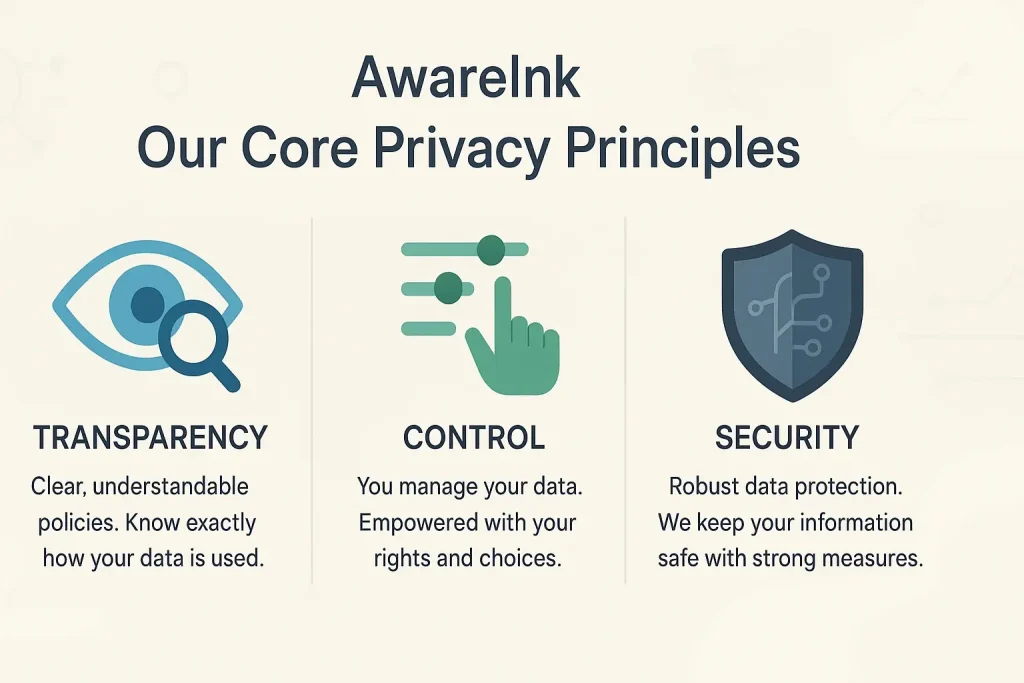Navigating the Noise: Why Critical Review Reading Matters for Mood Tech
Product reviews can overwhelm. New technology often amplifies this feeling. Mood-adaptive smart tattoos present a fresh challenge for discernment. Ever felt lost in a sea of glowing testimonials and scathing one-star rants? When it comes to something as personal as a mood-adaptive smart tattoo, cutting through that noise is absolutely critical. Unlike established products, emerging tech typically offers less reliable initial data, making your critical reading skills paramount.
AwareInk.tech empowers you. You can become a savvy consumer. A review detective, even. Our goal extends beyond simple purchase advice. AwareInk.tech aims to teach you how to think about what you read. True empowerment, we believe, comes from understanding how to evaluate information, not just consuming it. That's why we are arming you with the conceptual tools to spot genuine insights and separate them from marketing fluff.
This guide helps you identify key signals within future user feedback. What are the red flags in early commentary? What are the green lights indicating authentic experiences? Soon, mood-adaptive smart tattoo reviews and discussions will appear. You will need to discern truth from hype. Ready to sharpen your review-reading skills? Let's explore common pitfalls and potential hidden gems within those early smart tattoo narratives.
Spotting the Strings: Identifying Reviewer Bias (Affiliate, Sponsored, Personal)
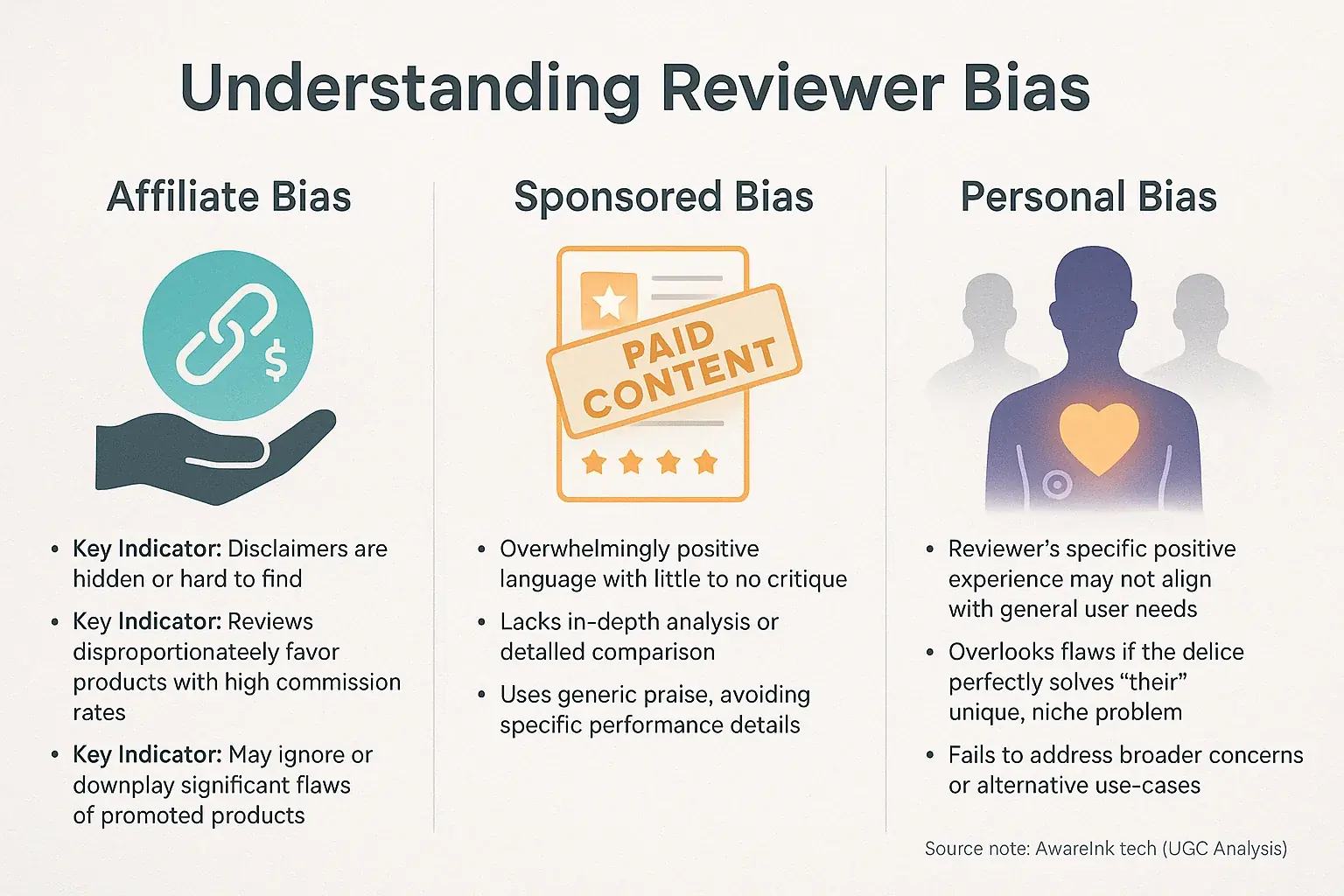
Many online reviews lack complete neutrality. Consider this. Some reviewers genuinely want to guide your smart tattoo decisions. Others serve hidden agendas. Bias subtly distorts the true picture of these advanced technologies. Affiliate marketing often influences content. Sponsored posts present another common source of skewed perspectives. Even deeply held personal preferences can unintentionally color a reviewer's final assessment. AwareInk.tech's synthesis of user feedback patterns confirms these influences are widespread.
Affiliate marketing frequently shapes smart tattoo reviews. Many "review" websites primarily function as affiliate marketers. These sites earn commissions when you purchase through their links. This financial incentive doesn't guarantee dishonesty. Yet, it can subtly steer recommendations towards higher-paying products. Always search for disclaimers. Are they clearly visible? Or are they buried in fine print? AwareInk.tech has noted users lamenting, "This review pushed me to buy X, but it totally ignored Y's flaws, which I only found out later."
Sponsored content presents a more concealed form of influence. Some brands directly pay for "reviews." These paid pieces often masquerade as unbiased expert opinions. Spotting them requires sharp eyes. Look for excessively positive language. Notice a lack of deep critical analysis. Generic praise can also be a red flag. Personal bias operates differently. A reviewer might genuinely adore a smart tattoo. Still, their specific positive experience might not mirror your own potential usage. They could easily overlook significant flaws if the device perfectly solved their unique problem, failing to address broader user concerns.
Beyond the Buzzwords: Fact-Checking Claims & Specifications
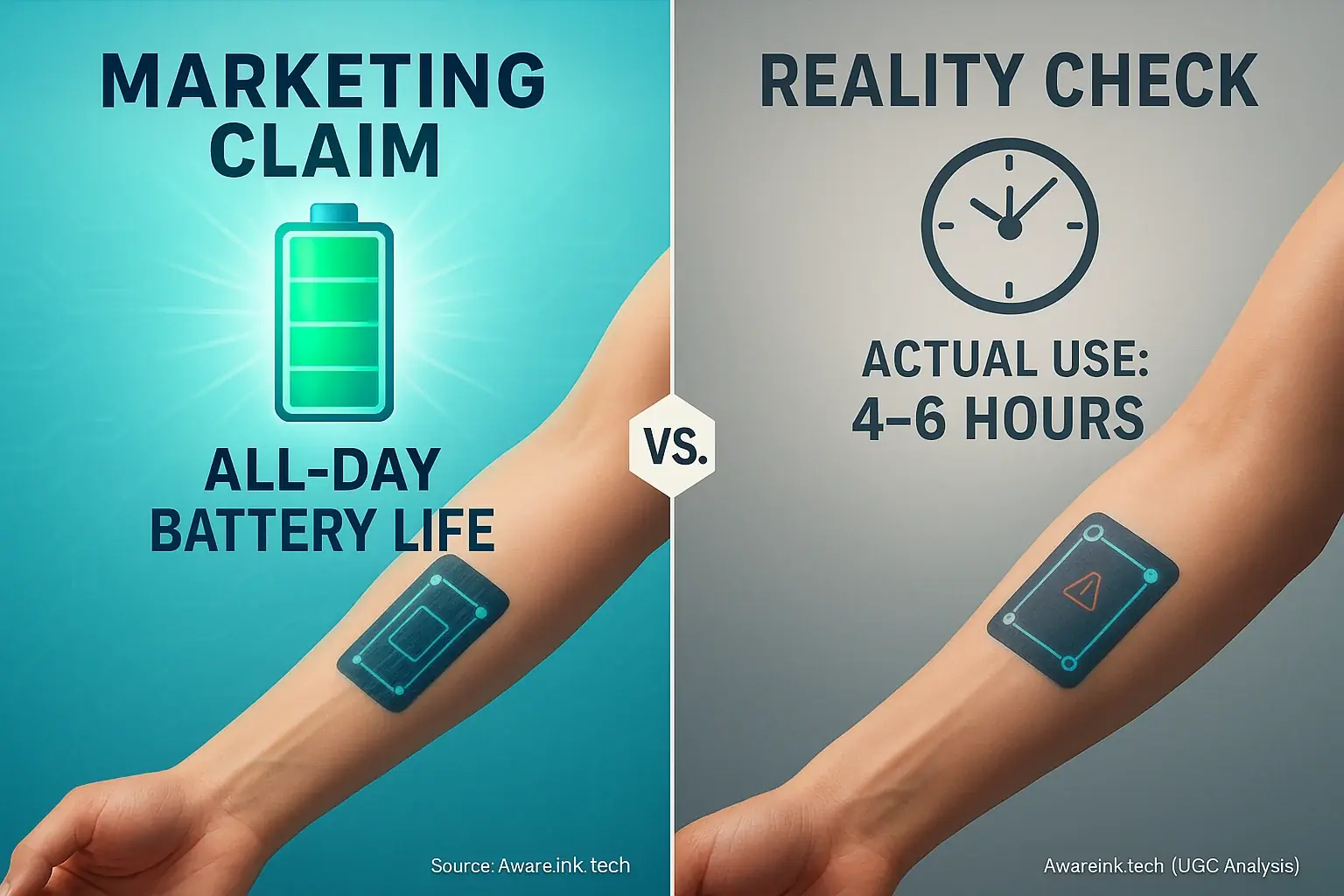
Manufacturers love impressive-sounding buzzwords. 'Revolutionary biosensors!' 'Unprecedented accuracy!' But what do those really mean for your experience? Vague promises often obscure actual performance. AwareInk.tech advises looking beyond marketing claims to concrete specifications.
Always cross-reference marketing claims. Official product pages offer one data point. Independent scientific sources can provide necessary context. A review might claim 'all-day battery life'. Check the specifications for actual milliampere-hours or expected active use. Another might promise 'instant mood detection'. Remember, biosensors measure physiological correlates, not direct emotions. So, 'instant' is a very strong claim. Many early adopters of similar wearables share a common experience. 'The ad promised continuous tracking,' they report, 'but it barely lasted four hours before needing a recharge.'
The real kicker often lies in practical application. Technology might perform as advertised under perfect lab conditions. Your daily life rarely mimics a controlled laboratory. This gap between lab results and real-world reliability is a critical consideration AwareInk.tech highlights. A trustworthy review details these everyday limitations, not just the polished marketing story.
The Test of Time: Seeking Long-Term User Experiences

New tech often dazzles. Smart tattoos are no different. A smart tattoo might seem revolutionary at first. Its design captivates. The data streams fascinate. But what about after a month? Six months? Time truly tests wearables. Durability can decline. Battery life might diminish. Sensor accuracy could falter. The real measure is sustained performance.
Seek feedback from long-term users. These individuals have experienced the tattoo daily. Do they mention skin irritation appearing later? Has the battery capacity noticeably decreased? Does the companion app still receive support, or has it become problematic? Are the sensors maintaining consistent data output? AwareInk.tech finds many users of other wearables share a common story. Early five-star ratings sometimes change. Battery problems often emerge after several months of use. They wish they had waited to review.
These extended experiences offer crucial information. They uncover the genuine cost of ownership. They show the device's true resilience. They determine if the initial novelty offers sustained benefit. Avoid the early excitement trap. Seek evidence of lasting performance. Does the technology prove its worth over time?
Who's Talking? Assessing Reviewer Expertise & Credibility
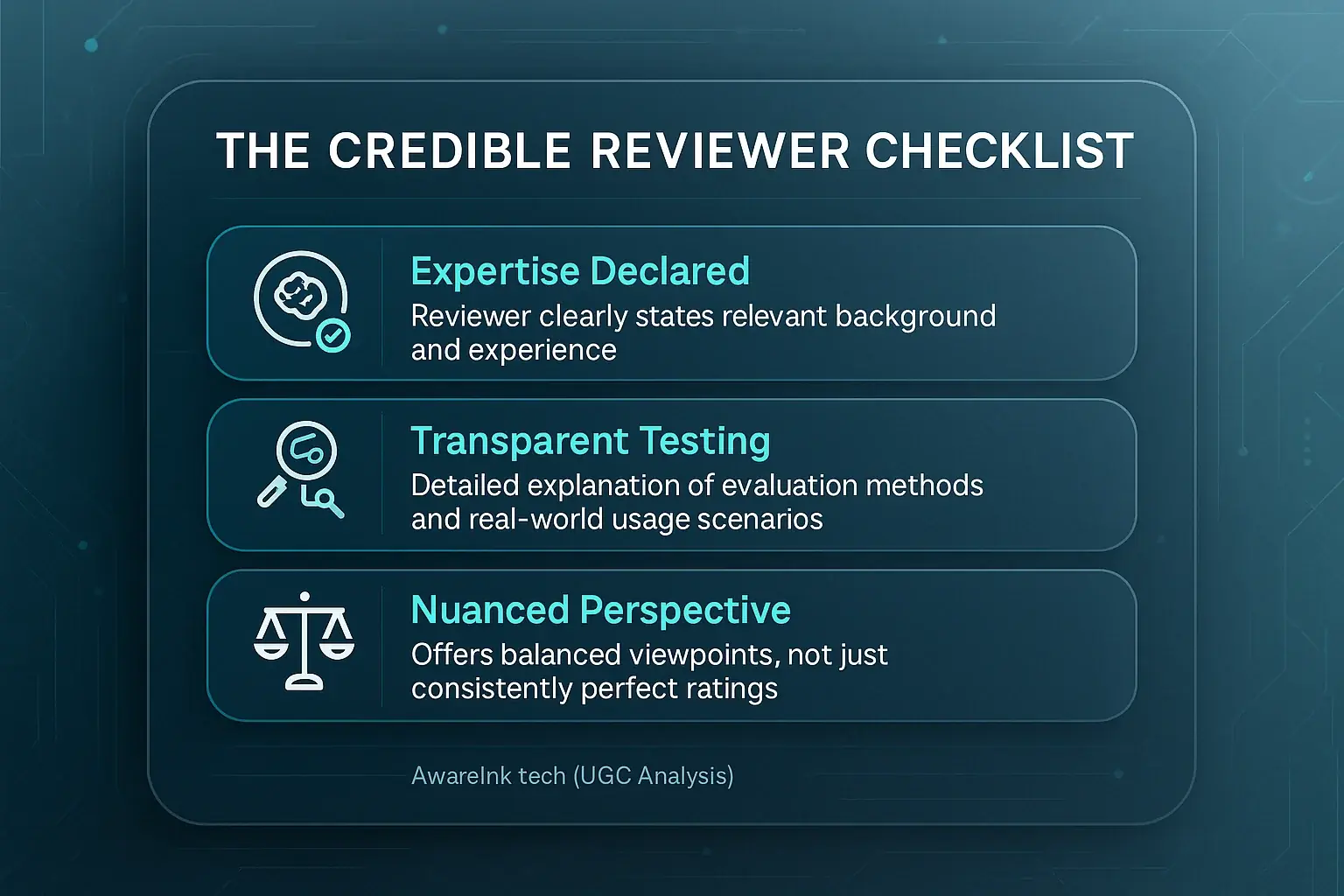
Anyone can write a review, right? But does that reviewer truly grasp cutting-edge biosensors? Or the subtleties of mood-adaptive tech? The source of any review matters immensely. AwareInk.tech's analysis suggests this crucial point often gets overlooked by users seeking quick answers.
Credible reviewers clearly state their background. Are they a tech journalist? A medical professional? Perhaps a long-time mindfulness practitioner? Or just a casual user exploring new technology? A good reviewer also shows how they tested the smart tattoo. They detail their evaluation process, not just their final opinion. Did they compare it to other devices? Did they use it consistently in varied real-world scenarios? This transparency reveals true expertise. AwareInk.tech's synthesis of user feedback patterns shows people value depth. For instance, a comment like, "As a biofeedback therapist, I used this smart tattoo daily for three months, meticulously tracking my own stress responses through different activities..." resonates far more. It certainly beats a simple "Loved it!"
What are the red flags then? You should be wary of reviewers lacking any stated experience in relevant fields. Consistently perfect ratings across all products also raise serious questions about objectivity. If a reviewer uses dense, technical jargon without clear explanations, they might be masking a lack of true understanding. Truly expert reviewers make complex ideas accessible to their audience. AwareInk.tech believes a reviewer's process often reveals more substance. More than their final score. The unspoken truth? A long string of flawless five-star reviews might not reflect genuine, unbiased feedback at all.
The Missing Pieces: Recognizing Cherry-Picked Data or Omissions
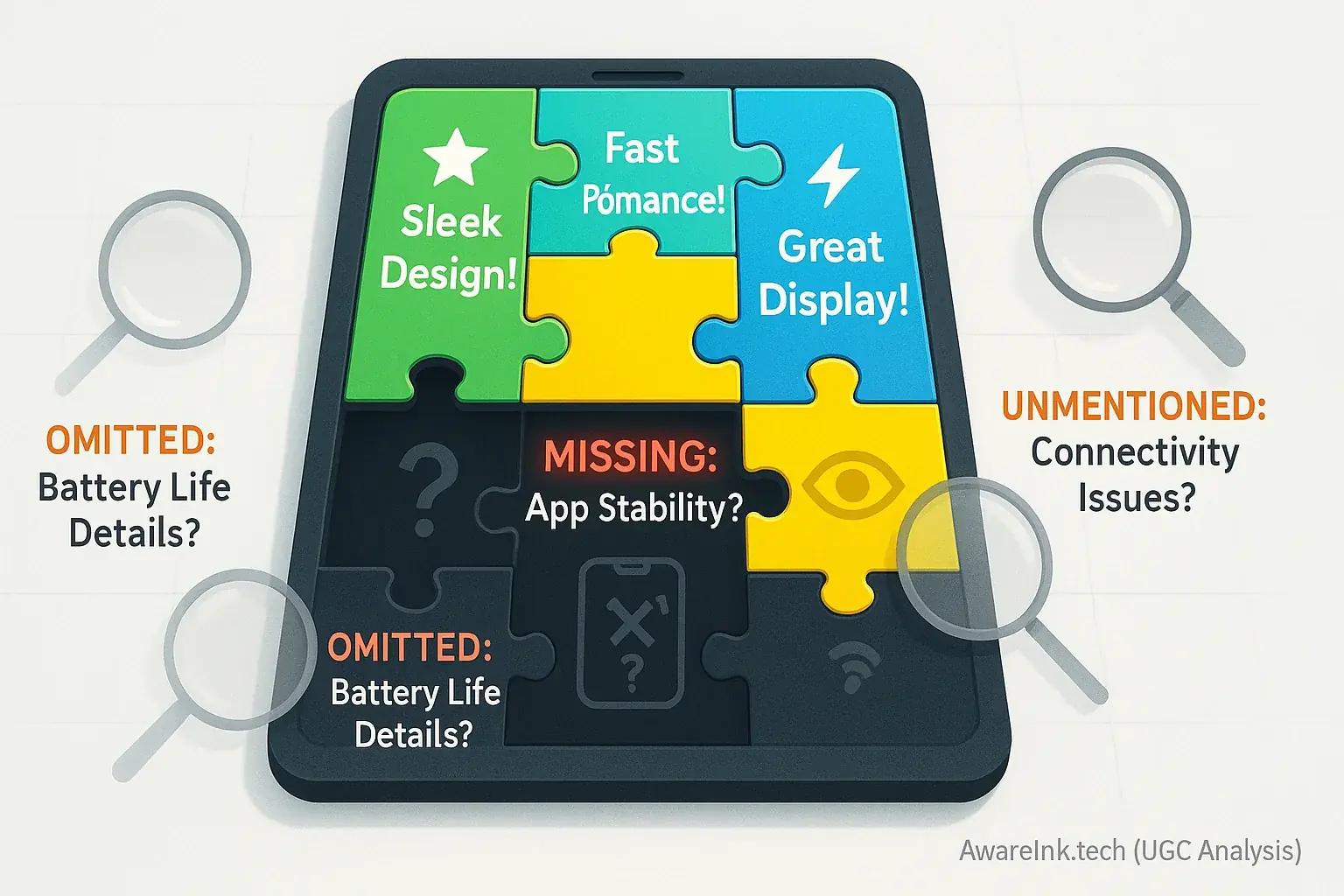
Some reviews omit crucial details. They present an incomplete truth. Cherry-picking describes this selective data presentation. It showcases only positive features, deliberately obscuring potential drawbacks. A perfect product image might hide a significant flaw just out of frame.
You should actively look for what a review omits. Does it praise tattoo responsiveness but never mention charging time? Or does it celebrate design aesthetics while ignoring user reports of connectivity issues? AwareInk.tech's synthesis of user feedback patterns reveals significant frustration when companion app stability is completely ignored. That crucial omission impacts daily use. Balanced reviews acknowledge both strengths and weaknesses, even minor ones.
Actively investigate what information is missing. Cross-reference details from diverse sources. User forums often highlight issues that polished reviews conveniently overlook. The 'unspoken truth', as AwareInk.tech's research suggests, emerges from patterns in broad user discussions. Silence in a review can indeed speak volumes about potential product flaws.
Your Informed Choice: The Power of Critical Review Analysis
Navigating new mood-adaptive smart tattoos demands a sharp eye. Your ability to critically evaluate reviews is your superpower. This skill protects you from marketing spin. It also shields you from biased opinions. You make informed choices. Your confidence grows.
Remember, no single review reveals the full story. You build a far more accurate picture by combining methods. Look for potential bias. Fact-check every claim. Seek out those long-term user experiences. Assess reviewer credibility carefully. Spot what reviewers miss. AwareInk offers transparent, deep insights to support you. Your personal needs, however, are your best guide. Your informed judgment is the ultimate filter.
Related Insight: AwareInk Community Hub: User Stories, Tips & Shared Wisdom on Mood Tattoos
Reviews give initial clues. They are helpful. But true depth? That emerges from shared journeys with mood-adaptive smart tattoos. AwareInk.tech actively synthesizes these user stories. We extract practical, community-sourced wisdom.
Soon, you will access this collective intelligence. Explore real accounts from users. Gain powerful perspectives. Our AwareInk Community Hub will offer this shared knowledge, helping you navigate your experience.


